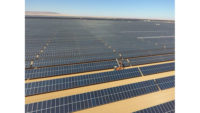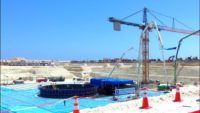Before the end of December, three international consortiums are set to start construction on three renewable-energy projects as part of Egypt's government-approved plan to generate 10.7 GW from wind and solar technologies by 2022. The three projects have a design capacity of 376 MW.
A consortium, led by French multinational electric utility company Engie, disclosed in October that it has signed a build-own-operate contract for a 250-MW wind farm in Egypt's Rhas Gharib area of the Gulf of Suez. Engie's partners include Japan's Toyota Tsusho Corp. and Eurus Energy Corp., which have a 40% share in the project, and Egypt's Orascom Construction Ltd., which has a 20% stake.
The project represents 3.5% of the total 7,200-MW wind-energy generation Egypt's plans over the next five years. Cost is estimated at $400 million. The Japan Bank for International Corporation, Sumitomo Mitsui Banking Cooperation, and French multinational banking and financial services company Societe Generale are providing financing.
Japan's export credit agency NEXIS is providing insurance coverage for the commercial lenders of the project, which will take 24 months to complete. Electricity generated from the wind farm will be sold to the Egyptian Electricity Transmission Co. under a 20-year power-purchase agreement. The company, however, could not immediately confirm the tariff at which it will buy the electricity from the project, said to be the first independent wind plant of its kind and size in Egypt. Likewise, Engie is yet to confirm the supplier, number or make of the turbines to be installed.
Engie, formerly GDF Suez, in June 2016 signed an agreement with Nareva, a Moroccan energy firm wholly owned by King Mohammed VI's holding company SNI, for the construction of between 5,000 MW and 6,000 MW of new generation capacity. By 2025, electricity would be delivered to the five African countries of Ivory Coast, Senegal, Ghana, Cameroon and Egypt.
Meanwhile, France-based Eren Renewable Energy S.A. has concluded financing for two solar photovoltaic plants at Egypt's Benban Complex, in Aswan province. The solar projects were awarded under the country's first phase of the feed-in-tariff (FIT) scheme, initially launched in 2014 by the state-owned New and Renewable Energy Authority. The agency's initial goal was to attract foreign independent power developers and financiers to Egypt's planned procurement of 4.3 GW of solar and wind power production by the end of 2017. Phase one of the FIT scheme provided for a tariff price of USD13.6 cents/KWh to 14.35 cents/KWh for projects with a minimum capacity of 500 KW and a maximum of 50 MW. Eren is partnering with Access Power, a developer, owner and operator of power projects in emerging markets.
The two solar PV plants, with a combined capacity of 126 MW, are being financed by a loan from the European Bank for Reconstruction & Development and Proparco, the private-sector financing arm of the French Development Agency. Both have jointly provided $111.6 million of senior debt for both solar PV plants.
The projects are also a part of Egypt's drive to generate 3.5 GW from PV and concentrated solar power technologies by 2022. Further, the projects are expected to reduce more than 100,000 tons of carbon dioxide emissions per a year.



